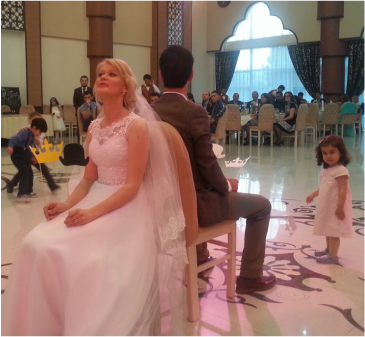 When we were planning our visit to Azerbaijan, while we were still in Ukraine, our host here emailed us and asked us if we’d like to attend a wedding during our stay. Our hosts are a Canadian man, married to an Azeri woman, who serve with IFES here in Baku. They had been invited to the wedding of two friends, both believers, and they were asking if we’d like to join them to go to the wedding of a couple we (of course) didn’t know. We did not hesitate to say yes, of course, knowing that this would a great chance to enjoy Azeri music, food and people, and to note cultural differences.
The game, allowing us to grow in affection for the couple we hardly knew, served as a parable of our ten days in Azerbaijan, for it had the same effect. Our times with staff and students, whether studying scripture together, drinking tea and hearing stories of conversion and courtship, riding rented bikes along the waterfront, or attending a beautiful and joyous wedding, allowed us to grow in appreciation and affection for a country we have just met for the first time. As we leave we don’t know about our return, but we know that if we do return, we’ll find dear friends here.
1 Comment
Steve colby
5/23/2015 03:34:53 pm
Really enjoyed reading this! Great analysis and connection to the wedding at Cana!
Reply
Leave a Reply. |
Archives
April 2024
AuthorRich and Lisa Lamb Categories |
 RSS Feed
RSS Feed